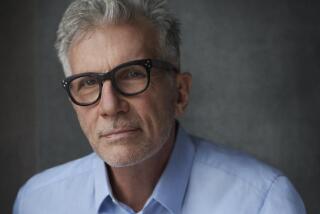Johnny Cunningham, 46; Fiddler Helped Revive Celtic Music, Explored Rock ‘n’ Roll
- Share via
Johnny Cunningham, a multifaceted Scottish fiddler who helped lead the revival of traditional Celtic folk music in the 1970s, branched into American rock ‘n’ roll, then composed the score of “Peter and Wendy,” an Obie Award-winning play that explored some of the darker themes in J.M. Barrie’s “Peter Pan” tale, has died.
Cunningham, 46, had a heart attack Monday in his Manhattan apartment and was pronounced dead at Cabrini Medical Center, according to funeral director Joseph Guidetti.
Among the fiddler’s hallmarks were his ability to play at a furious pace without sacrificing a lyrical, full-bodied tone. He could extract the full measure of sweetness and ache from the heartbreakingly beautiful melodies of Celtic balladry.
“From being the fastest fiddle in the West during his teens ... he became an acclaimed master of the slow air, that seemingly simple but in fact devilishly fragile form that invariably sorts out the musical men from the boys,” Scottish music journalist Alastair Clark, who had followed Cunningham’s career from his early days with the groundbreaking band Silly Wizard, wrote in an appreciation published Wednesday in the Scotsman newspaper.
The traditional music that Cunningham played was considered passe in Scotland when Silly Wizard formed in Edinburgh in 1972. He was 14 when he joined the band, while his younger brother Phil, an accordionist, joined several years later.
“The younger people were ignoring their own culture, because they thought it wasn’t good enough in the eyes of the world,” Johnny Cunningham recalled in a 1993 interview with The Times. Along with a handful of like-minded bands, including the Irish groups Planxty and the Bothy Band, Silly Wizard helped lead a revival that fused traditional Celtic sounds with rock ‘n’ roll energy.
By the time Silly Wizard disbanded in 1988, Cunningham said proudly, Celtic folk had become “a cool thing. You didn’t need to play an electric guitar. The life was back in it again.”
Cunningham, who moved to the United States in 1980, also loved rock music. When members of the Raindogs, which was just forming, happened upon him playing alone in a corner of a Boston bar, they invited him to join -- oblivious, at that point, to his achievements in the traditional folk world.
The band recorded two albums, “Lost Souls” and “Border Drive-In Theatre,” for the Atco label in the early 1990s, and toured as an opening act for Bob Dylan, Warren Zevon and Don Henley. But the albums failed to sell well, and the band broke up.
Raindogs frontman Mark Cutler recalled Cunningham on Thursday as a man who was “larger than life, a hard liver who lived on his own terms.”
Cutler added, “He was one of the funniest people I’ve ever known. Being with him was like being one of the Three Musketeers. If you had him on your side, you felt like you could take on the world.”
Liza Lorwin, who produced and adapted “Peter and Wendy” for the experimental New York City theater company, Mabou Mines, said Cunningham “brought this bright, shining life. Everyone felt a little more alive and awake.”
After the Raindogs, Cunningham played in Nightnoise, a group that incorporated jazz, New Age and chamber music influences. His other ongoing ventures were the Celtic Fiddle Festival, with Irishman Kevin Burke and Christian LeMaitre, a fiddler from Brittany, and his partnership with the New York-based Irish singer, Susan McKeown, who also was part of the “Peter and Wendy” ensemble. Cunningham was in a New York studio recording with McKeown on the day he died, said Trisha McCormick, the fiddler’s girlfriend.
Cunningham wrote the score and most of the lyrics for “Peter and Wendy,” in which puppets performed while a lone actress spoke all the roles. Cunningham was a key part of the performances, serving as fiddler, vocalist, kazoo player and musical director. The show won a 1997 Obie Award for best Off-Broadway production. It ran later that year at the Geffen Playhouse in Los Angeles and at the La Jolla Playhouse in 2002.
Mabou Mines recently commissioned Cunningham to compose a world music score for another play, “Song for New York,” a task that he had barely begun when he died.
Cunningham’s fiddling career was jeopardized when he badly broke his left wrist running on the beach at night during the La Jolla run of “Peter and Wendy,” but he mended and came back strong.
“It was wonderful to hear him over the past year,” said Lorwin, who liked to hear Cunningham at his favorite Manhattan hangout, the 11th Street Bar, where mourners gathered Thursday to remember him.
What he especially liked about “Peter and Wendy,” Cunningham told the Post and Courier of Charleston, S.C., was its emphasis on the darker elements in the Barrie tale, its evocation of the grief that comes with growing up. “Being a Scot,” he said, “wallowing in melancholy is the kind of thing I love.”
But he also found affirmation at the root of the Celtic sound. “What we have as a people is humor and resilience and a way we can laugh at the worst things,” he told The Times in 1993. “That’s an important thing to take hold of.”
A memorial for Cunningham was held Thursday at St. Mark’s Church in Manhattan. Another is expected in Scotland. In addition to McCormick, of New York City and his brother, Phil; he is survived by his mother, Mary; and a sister, Laura, all of Scotland.
More to Read
The biggest entertainment stories
Get our big stories about Hollywood, film, television, music, arts, culture and more right in your inbox as soon as they publish.
You may occasionally receive promotional content from the Los Angeles Times.











